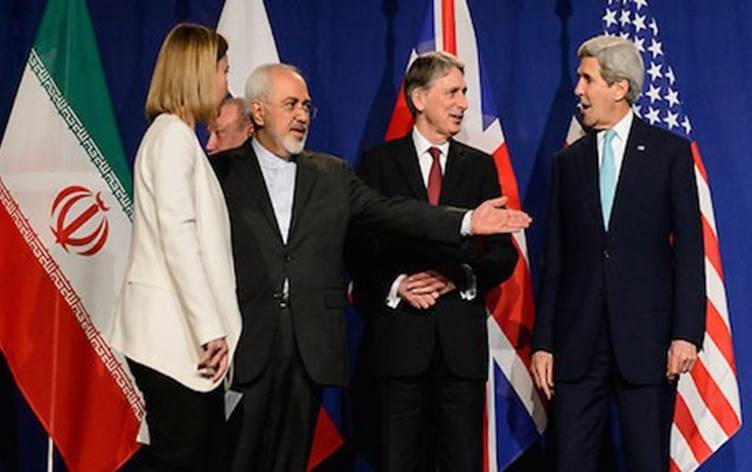The Iran deal cannot be looked at as black or white. As a former military intelligence analyst I always look at all sides of a potential conflict. Once analyzing one side’s plan and its effects on the other side and potential responses, an analysis must be done on the potential impacts on both equally. The Iran deal has been filled with arguments from one side or the other, and I would like to speak to its potential impact on the region in general, and Iraq in particular.
Breaking down the agreement into two parts, first to hold Iran back from developing nuclear weapons, and second to release impounded funds and lift economic sanctions. The first part is designed to hold back nuclear weapon development for ten to fifteen years, it will not. Given the history of Iran and its failure to uphold international treaties the best we can hope for is eight years. So the first point is we have eight years to come up with a new plan. The second part will have the most immediate impact on the region, the releasing of funds and lifting of sanctions.
The monetary aspect of the agreement is also broken down into two parts. The first will increase the standard of living for most Iranians living in the major metropolitan areas, as food and other necessities begin to flow. European nations, as well as Russia and China, have already been to Tehran and new business ventures will increase the employment picture and allow more consumer spending for the new products flowing into the country. The first part increases imports and the second part of monetary expansion will increase exports. Unfortunately Iran’s major export item recently has been terrorism.
The military organization responsible for carrying out Iranian expansion and controlling Iranian proxy fighters is the Quds force, a part of the IRGC, Iranian Revolutionary Guard Corps, which is separate from the Iranian Army and under the direct control of the Supreme Leader, Ayatollah Ali Khamenei, and its sole mission is extraterritorial operations. The Quds force will likely be the beneficiary of a good deal of the released funds and will have access to the increased monies flowing from sanctions release. In fact the IRGC budget is expected to increase 30% following the release of funds. The immediate impact will be felt in Iraq as Iran pushes to increase control across the region.
Iran has shown no hesitation in supporting its Iraqi neighbor, at least the Shia population and government and to that end has armed, trained and lead Shia militias against US and Coalition forces in Iraq and currently against ISIS forces in the Sunni region of Iraq. An increase in Quds force funding will increase the level it can control the Iraqi government through its control of the militias. Additionally it increases its ability to support Hamas, Hezbollah and other proxy forces in the region as well as its support to the Assad regime in Syria.
The unknown is once the Quds force increases it activity in Iraq and the region what will the regional actors do. The Sunni militant group ISIS, have a very strong hold on the Sunni region of Iraq and the Iraqi military has had very little impact or shown any ability to dislodge them. The Iranian controlled Iraqi militias have proven to be a force multiplier but have done little to push back ISIS, only to contain them in the Sunni region. The Kurds in the north have had better luck in their fight with ISIS but also have only been able to protect their region as well as supporting the Syrian Kurds in their fight while getting little help in weapons or funds from Baghdad.
In Syria the Kurds again have been successful in securing their area but ISIS is in firm control of the center of the country and the rebel Free Syrian Army spends most of its time fighting among itself and the Syrian regime, propped up by Iran, and is just trying to hold on.
The result of all this is that Iran’s new found wealth and increased support to its allies, will allow the secular divides in these countries to increase and may ultimately lead to a breakup along natural lines. Should the Kurds leave Iraq and Syria and find their way into union, Turkey will increase its attacks on the Kurdish population of not only Turkey, but Iraq (which will be known as Kurdistan) and any other Kurdish population center. Saudi Arabia will need to make peace with ISIS or throw the weight of their military to defeat them and in the end absorb the Sunni region of Iraq and potentially Syria. The Shia area of Iraq will be absorbed into Iran or made a puppet nation under Iraq.
This is not the intent of the agreement but could very well be the result of unanticipated result, long before any impact of the nuclear side is felt.
Paul Davis is a retired US Army military intelligence analyst and a consultant to the American intelligence community specializing in the Middle East with a concentration on Kurdish affairs. Currently Mr. Davis is the President of the consulting firm JANUS Think in Washington D.C.
The views expressed in this article are those of the author and do not necessarily reflect the position of Rudaw.



Comments
Rudaw moderates all comments submitted on our website. We welcome comments which are relevant to the article and encourage further discussion about the issues that matter to you. We also welcome constructive criticism about Rudaw.
To be approved for publication, however, your comments must meet our community guidelines.
We will not tolerate the following: profanity, threats, personal attacks, vulgarity, abuse (such as sexism, racism, homophobia or xenophobia), or commercial or personal promotion.
Comments that do not meet our guidelines will be rejected. Comments are not edited – they are either approved or rejected.
Post a comment